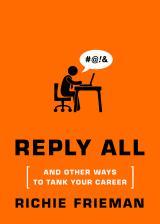How to Be a Good Panelist
When you’re speaking to an audience as part of a panel discussion, this isn’t the time to check your email, post social media updates, or make small talk with a fellow panelist. Modern Manners Guy has 3 tips for how to be a great panelist.
Richie Frieman
Listen
How to Be a Good Panelist
Recently, I was watching a YouTube clip of a panelist discussion between four technology professionals. The panel took place in a large auditorium filled with eager fans waiting to hear the panelists’ opinions on mobile technology. Yes, this was a room full of tech-geeks like myself, but I found it rather distracting when each panelist was “social media-ing” during the entire talk.>
“Social media-ing” is when you ignore everyone around you so you can play with whatever app on your phone that distracts you from what you should be doing. Basically the panelists would share their thoughts, the audience would clap, and then the panelist would go back to tap-tap-tapping away on their smartphones while others talked. One guy had a laptop with him! I mean, the talk was only an hour – what is so important that it just can’t wait? After all, you’re the star of the show!
So, if you’re ever invited to speak to an audience as part of a panel, consider my tops 3 Quick and Dirty Tips so you don’t seem rude and disinterested:
Tip #1: You’re the Star – Enjoy it!
As I said, while watching this YouTube clip of a tech panel I was shocked how each panelist so openly busied themselves with their smartphones during the event, as if no one was watching. One guy even said, “What? I’m sorry…” before looking up from his phone when the moderator called his name. Yes, this was a tech talk so smartphones are as essential to these guys as a knight’s sword is to battle, but there comes a time when you have to lay down your weapon. Out of the few hundred people in the room, five of them (the panelists and the moderator) were the stars of the show.
As well, it’s not like these panelists were grabbed while leaving the bathroom at the venue and told they had to speak on stage – they knew about it for months. They agreed to be a part of the program and for a whopping hour all they had to do was talk to hoards of people who waited in line to listen. All that ego-boosting and yet, the smartphone was more important.
I’ve talked about bad manners during a presentation and improper body language, but this was a combination of everything you would never want to do on stage. This happens a lot in business meetings when someone is bored or not engaged, they whip out their phone to do some other work. It’s as if we can’t function without our precious smartphones for more than 30 seconds. When you are on your phone (or laptop) while something is going on, it shows that:

B) You don’t want to be there.
C) You have better things to do.
D) You don’t care how rude you are to everybody.
You may fancy yourself a multitasker, but now is not the time to show off those skills. When you’re a panelist, people want to see you engaged and in the moment with them. The second you look at your phone, it shows that you’ve checked out. Simply put, it clearly shows a lack of common courtesy to the people who came to see you.
Tip #2: Don’t Be a Wallflower
Even if you don’t stare at your smartphone as if it contains the meaning of life, not engaging in the discussion is just as bad. You might as well not be on stage at all. Whenever there is a panel discussion, there will always be one person who is more outgoing, or outspoken than anyone else. This is totally fine, and you can’t blame someone for having more charisma in front of crowd than others. However, this stage is meant for more than one star.
It doesn’t matter that you live the rest of your life like a hermit – if you agree to be on a panel, you’ve taken on a public responsibility. This is not the time to stay quiet. Even the rejects from my example in Tip #1 at least said something relevant to the discussion before they went back to stalking their ex-girlfriends on Facebook. So in that sense, they win over the Wallflower.
I am not one to blame a Wallflower or introvert for being stressed out by public speaking. In fact, being nervous about speaking in public is one of the most common and prevalent fears out there. (Just ask my colleague, the Public Speaker, who deals with this sort of thing every day).
If you sit idle behind the table, allowing others to steal the spotlight, the audience members may think you are not knowledgeable at all.
Granted, I feel right at home in front of any number of people, but if you don’t, just remember one thing: You’re not on trial, it’s not a test, and (most importantly) you already know all the answers. Your expertise landed you on this stage, nothing else. Keeping that in mind should give you the confidence to get through the painstaking task of speaking in front of people. The audience isn’t there to boo you – they’re there to learn.
If you sit idle behind the table, allowing others to steal the spotlight, the audience members may think you are not knowledgeable at all. They may even start to wonder why you’re on the panel in the first place. And by the way, you don’t have to give long-winded entertaining speeches either. After all, there are other people on stage with you, so say your part whenever appropriate, stay quiet when you don’t have anything useful to add, and you’ll be golden.
Tip #3: Don’t Fidget

Knowing that, whenever I give a presentation, I am always overly-conscious of my fidgeting. What happens when you fidget or sway side to side is that you take the entire room’s attention with you. People lose focus because in the corner of their eye they see you and it distracts them from the main conversation. As well, fidgeting can be misconstrued as both a lack of interest and a lack of maturity. After all, if you were comfortable and authoritative on stage, why would you be moving around? And what kind of adult can’t sit still for a half hour?
Knowing that others many confuse my fidgeting for a lack of interest in the discussion, I make it a point to consciously limit my movements as much as I can. I try to put my hands in my pocket or grip a pen so I don’t roll my hands together like some evil sorcerer, as I sometimes do. I also request a chair that does not swivel, to avoid swaying side to side. And I also always leave the water bottle on the table and not in my hands, so I don’t play with the wrapper or top or constantly take swigs when I don’t need to. I know these sound like childish acts but you’d be surprised how many times I’ve witnessed other presenters do the exact same thing.
The key to being a proper panelist is to always remember that you have been given a chance to shine in front of a group of people who respect you for your skills or expertise. There is nothing to stress about because you’re in the driver’s seat. So, buckle up, check your mirrors, make direct eye contact, and for goodness sakes – don’t fidget.

Do you have any recent graduates in your circle, or perhaps someone who is looking to start a new career, check out my new book, Reply All…And Other Ways to Tank Your Career for great tips and advice on job success. It’s available now!
Panelist image courtesy of Shutterstock.
